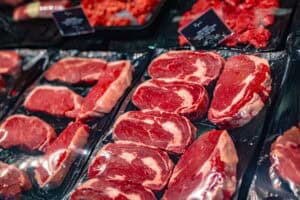Premier Ntuli said they have enough land in KZN to address food insecurity experienced in various areas.

The KwaZulu-Natal Department of Agriculture and Rural Development together with the Human Sciences Research Council (HSRC) have tabled measures aimed at addressing food security risks in the province.
The HSRC conducted a survey which shows that although South Africa is considered a food secure country, various areas in the KZN are in trouble.
Premier Thami Ntuli said agriculture plays a critical role in the economy and poverty alleviation. He also noted that the sector faces significant climate patterns that affect the weather, urbanisation, growing population, pollution, rising input costs and many others.
Food insecurity in KZN
Food security refers to the availability, access, utilisation and stability of food. This can also mean people have enough nutritious food to meet their dietary needs.
The findings of the HSRC survey were tabled at the Agricultural Extension Indaba in Durban on Tuesday. Before making remarks about the survey, Ntuli said the Indaba is about promoting excellence among agricultural advisors who are key to ensuring the sector thrives.
ALSO READ: Half of SA population will be food insecure by 2025
This year’s Indaba was held under the theme “Bridging Collaborative Initiatives for Strengthening the Research-Training-Extension-Farmer Nexus”.
“It underlines how the development of the value chain of the agriculture sector is to the programme of economic growth, job creation and the fight against poverty and food insecurity,” he said.
Ntuli noted that the best extension officer plays a multifaceted role as a facilitator and a communicator who guides the farmer in decision-making, ensuring that the most appropriate knowledge is implemented in a bid to achieve sustainable production goals and orderly land use and development.
Enough land to address food insecurity
Ntuli said they have enough land in the province to address food insecurity experienced in various areas. “I fully understand that there is a complex balance that needs to be struck between development, human settlement and food security. But we have to creatively use land to support agricultural activities.”
He acknowledged that unemployment remains a thorn on the country, and the sector can help with offering employment, especially to women, youth and vulnerable group. However, the sector lost 45 000 jobs in the country.
“Unemployment is linked directly to access to food, and it impacts directly on food security.”
SA is not food insecure
The premier welcomed the findings by the HSRC that the country is not really food insecure, however, there are pockets of people who do not receive enough meals or adequate nutrition from what they eat. However, there are various districts in KZN that experience food insecurity.
“A total of 17% of the household in the province suffer from severe food insecurity, while 4,3 suffer from severe hunger. Severe food insecurity was more prevalent in the Zululand district where 35% of the households were severely food insecure and 17.1% and 4.3 % experienced severe hunger,” he said.
He acknowledged that it is the government’s responsibility to aid in increasing food security through agriculture and other sectoral interventions.
ALSO READ: Africa needs electricity for its food security
Employment in KZN, according to HSRC report
The report’s findings also include the employment status in the province, which aligns with the the Stats SA’s findings that more women in the country continue to shoulder the burden of unemployment.
The findings reveal that 57% of female household heads were unemployed compared to their male counterparts, with 38.2% being unemployed.
“About 71% of female household members were unemployed, compared to 63.9% of males. Among the youth, those aged 34 years and younger, the unemployment rate was 52.6% and 78.5% for household heads and members, respectively.”
The highest unemployment rate for household heads and members was reported in the province can be found in the Zululand District, with 72.2% and 81.9%.
ALSO READ: Young children in SA face rising poverty, malnutrition post-Covid – Childhood Review
Recommendations to address food insecurity
The recommendations listed in the survey details that there must be promotion of domestic food production. “This will involve encouraging families to produce their own food to ensure food security at household level by way of providing inputs and market opportunities. In KwaZulu-Natal, most families rely on subsistence agriculture for food.”
Another recommendation is on focused investment and the establishment of food banks. This can be done by creating an enabling environment for commercial food production.
“There is need to increase agricultural production in each district through focused food production and agro-processing investments.”
The recommendation lists that there should be focus on employment creation. “Targeted intervention through an agric-sector employment creation drive. A combination of high levels of unemployment and dwindling incomes means that vulnerability to food insecurity will always remain high.”
There should also be enhanced food safety, which will focus on informal traders and small businesses that trade in agricultural products.
It has been discovered that the traders need assistance to help improve the quality of their services through quality assurance and extend the lifespan of their products. Covid has irreversibly transformed human perception of food and food safety.
NOW READ: Experts predict greater food security threat in Africa over the next two decades






